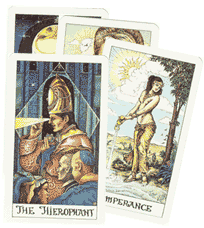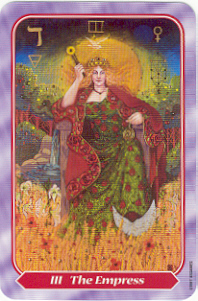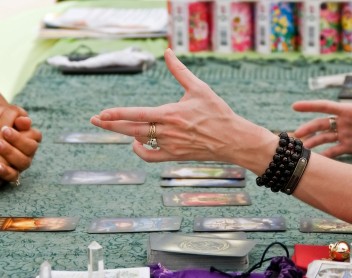Beginners Guide to Tarot Cards
Posted by Brett Almond
Tarot cards - What are they?
Tarot cards are pictorial representations of events and energies that we are likely to encounter in life, such as determination, patience, new beginnings, leaving things behind, joy, togetherness, heartache, reflection, decision-making and many more. Tarot decks normally contain 78 cards, 22 of which are referred to as the Major Arcana and depict the major changes on our path through life.
The remaining 56 cards, known as the Minor Arcana, expand on these themes. Like a pack of playing cards, the Minor Arcana are made up of four suits - wands, representing the spirit/fire, cups the emotions/water, swords the mind/air and pentacles the physical world/earth - numbered 1 to 10, Page, Knight, Queen, King. Some decks use different names for these suits, and others substitute Prince and Princess for Page and Knight, but most of the qualities represented by the cards are similar.
The tarot can be used as a divining tool by reading cards that are selected unseen from a deck, and interpreting the interaction of the cards and their positions in a spread (specific layout), with reference to issues of importance in your life.
A brief history of tarot cards
The exact origins of tarot cards are unknown. Playing cards were in use in China in the eleventh century, and there is also evidence to link its origins to India and to Buddhism, although one of the most likely theories is that it originated in Egypt, where it is thought the priesthood used the cards.
From these uncertain origins, the tarot survived (at times hidden, ironically, within church walls and at other times being used merely as a gaming tool) relatively unchanged until the 19th century, when several new decks were produced. Because of the small scale of production, these were probably limited in their circulation to those with an active interest in the occult.
The first commercial deck - the Rider Waite deck - on which many modern decks are based, was produced in 1910 by A. E. Waite. The tarot has continued to grow in popularity, and modern printing methods ensure that it is becoming available to anyone who wishes to explore its uses. This is not to say that everyone understands the tarot - only study and personal growth can help to reveal its many mysteries.
Can the tarot tell me my future?

The tarot can be used to map out trends in your future. It cannot give you definitive answers, but it can tell you what is likely to happen if you follow your current course of action. For example, it may show that if you keep shutting yourself off from your partner, you are likely to continue being unhappy.
Some tarot readers do have clairvoyant abilities and they may see you with three children in the future, but the final choice is yours. There is nothing to stop you using contraception after your second child, or using none after your third. The future is in your hands and no one else's.
If a tarot reader tells a 25-year-old woman that she will marry when she is 35, she may not let any man near her for the next decade. However, she could meet the man of her dreams the week after the reading and may live with him for 10 years before deciding to get married. You must decide if you really wish to know your future. Do you really want precise details even if the tarot reader is clear enough to see them? What good will it do to know how many children you are going to have, and what if the reader's prediction is wrong?
It may prove much more useful to examine the current issues in your life. How are you approaching your work, your family and your social life? How can you make things better for yourself? What is going on subconsciously? The tarot can help you to understand yourself better, throwing light on things that were previously far from obvious. At times you may find yourself thinking, 'Ah, now I understand why I was feeling like that!' and wondering why you didn't see it before.
How do I find the answers to my questions?
It is perfectly acceptable to ask a specific question before a reading. Sit quietly for a moment while connecting to a higher purpose, then ask, for example, 'Should I take the job that I have been offered?' The tarot cards can clarify the subject, allowing you to make a decision based on an understanding of the related issues, but it does not contain a Yes or No card. If all you want is a yes or a no, then it may be better to scrunch up two pieces of paper in a hat and pick an answer - but would you act on that advice, without being able to see any reasoning behind it?
The tarot is about making informed choices and not about definite answers. It's about using the insight you gain from the cards to make up your own mind. The intention you hold when reading your cards is important. It can be tempting to quickly scan a spread, look up a couple of brief definitions and then move on because it doesn't look like the response you expected. If you always approach the tarot in this way, the answers to your questions will be shallow ones. If you spend some time trying to understand what each card is telling you, then put them away and reflect on them throughout the day, the answers you receive may be a little deeper or more revealing. Over time, your attitude to your cards shapes your relationship with them, and if you give them respect for what they can teach you, the answers to your questions will prove much more meaningful.
How do I choose a deck?
There are many tarot decks available. The Rider Waite deck is widely used, as many people feel that the energy of each card is portrayed very clearly. The Tarot of the Old Path is popular amongst those who are drawn to white witchcraft and nature-based religions, and the Cosmic Tarot is useful for those who prefer a deck with fewer symbols.
The tarot card decks that we carry on this site are ones we feel have been created with good intention and with a thorough knowledge of the tarot. Over time, we can all develop sensitivity to the energies symbolised by the tarot, but it helps to choose a good deck, whose creator was clear enough in himself or herself to illustrate the cards energies accurately. What may seem the clearest deck to others may not appeal to you, so when selecting a deck use your intuition and choose one with which you feel an affinity.
We stock other kinds of cards that do not conform to the system of the tarot and we have called these divination decks. These have various numbers of cards and may not represent energies in the same way as the tarot decks, although they contain many cards with similar attributes. They are like tarot cards in that they are graphical representations of energies that are best understood by feeling rather than thinking.
Choosing a spread
There are many tarot spreads in use, and most tarot books include at least a few examples. There is no need to use

a wide range of spreads. Pick a few that you feel comfortable with and develop your understanding of which situations they are best used for.
When doing a reading use your intuition to decide which spread is best - you don't necessarily need to know why. There is no reason why you should not design your own spread. You may make up a 'find a new job spread'. One card may represent your relationship with your current job, another for the kind of work you would be good at, and a third for what you need to change about yourself to help you get the job you want. A fourth card could represent the outcome of the situation if you changed yourself in such a way, and a fifth could be a keynote (overall flavour) for the spread. Write down the position and meaning of each card in the spread before you begin so that you are absolutely clear about how it will look and work.
How do I start reading the tarot cards?
There is no quick way of becoming a good tarot reader, just as there is no way to become a good car mechanic or counsellor overnight. The easiest way to learn is to buy a deck of cards and study the pictures, read the occasional book, do some practice readings on a trusted friend and bear the cards in mind as you go about your daily business.
Everyday situations may call to mind certain cards, and making these associations will help you to get a feel for the tarot. For example, your boss may be a successful businessman, unstoppable once he has set a goal. You may observe that he sometimes misses other opportunities because he is so focussed on his initial project, and he may forget to share a joke with his staff. This may suddenly remind you of the Knight of swords, giving you a deeper understanding of that card which will be useful in future readings.
You may have an inherent understanding of some cards, whereas it may take you years to gain a deeper knowledge of others. Reading the tarot cards can be compared to learning a new language. You begin by studying individual cards, as you would learn individual words. You then become aware of how the cards in a spread interact, which can be compared with learning to put words together to form sentences. As you practise speaking a new language you become familiar with its nuances and notice how different inflections can change the mood of a sentence. For example you can ask someone to, "please switch on the kettle", in a soft or neutral tone, or you can bark it, putting heavy emphasis on the "please" and making it sound as if you have been asking for hours, and this is the last time you are going to ask before you get really angry with them. There are so many ways that you can ask or tell people things.
Tarot cards, like words, can have very different meanings dependent on where they appear in a sentence or spread. When you have been learning a new language for a while you start to think in that language. When you are learning how to read the tarot, there comes a point at which you no longer have to believe in it because it becomes natural. You know that it works because you have experienced it numerous times. When you read for someone else you become a storyteller, looking for the best place to start the story and the best way to relate it to the other person. If you cannot see what is going on in a certain part of the spread, the cards may be describing a relatively inaccessible part of their personality. You may want to ask questions about that area to help them express what has been hidden or unclear.
Many study the tarot purely for personal use, laying out a spread only when they wish to understand a situation in their lives. The tarot can help to clarify what is happening, making their options clearer and giving them the confidence to move on. Books can help you on your quest to read the tarot but the main learning comes from within. How does a card feel? Trust your intuition. For example, you may be doing a reading for someone and a card may seem very fiery, like there is something inside them bursting to get out. You can also apply your experiences of the energy of the cards in your own life - for example, the next time you get the Knight of swords in a spread you may think back to the example of the determined boss and ask yourself, 'Am I focussed enough?' or 'Am I too focussed?'
Are tarot cards safe?
Some people are concerned that the tarot may be evil - that it may somehow be a means for doing harm or for channelling bad spirits. A reader only uses the tarot as a tool. You can drive a car dangerously, or use it to bring families together or to visit places to which you'd otherwise have no access - so it is with the tarot.
You do need to take some care if you are looking for a tarot reader. Before having your cards read, ask yourself if you'd feel comfortable lending them money, or telling them a secret. If you don't feel you would trust them in some everyday matter, neither should you trust them to read your cards. When you allow someone to read your tarot, you are essentially laying a piece of your life on the table to be examined, and giving them the power to tell you what they see. The danger lies in what they might say and how this can affect you.
If a reader is bitter and angry the tarot may be a vehicle for these qualities, and you could end up feeling the same way. Careless readers may tell you things in an inappropriate manner - saying, for example, that they see no future for your current relationship. You may have been married for 10 years and this thoughtless comment could leave you feeling lost, confused and with little hope for the future. Responsible readers will explore what they see in the cards in a more feeling way, commenting that there seems to be a lack of communication between you and your partner, or saying, 'I sense you are not showing your partner all of your personality. Why is this?'
A reader cannot decide that there is no future for your relationship with someone because that is up to you. Stating that it has no future almost denies you the right to see the situation clearly and make your own decision - you may think that the cards have told you that your marriage is over, so you must get divorced. Just one irresponsible comment can cause chaos in someone's life, and in that way, the tarot can be dangerous.
Summary

The tarot can help us to know ourselves better and to understand why things happen to us. Acting as an open book of philosophy and psychology, it helps us to see the deeper purpose in our lives and to understand human nature. If you start to believe that the tarot works - really start to be convinced of it, or on some level really know it - what does that mean? It may be worth considering this question more deeply.
How is it that these cards fall in the right places? Does it mean that you believe in a God? Does it mean that all material is in some way intelligent in that it knows where to go? Or is a deeper part of you influencing the way you shuffle and select the cards and, if so, how does it know where all the cards are to put them in the right order? Accepting that the tarot works can cause a big life change for some, calling many established beliefs into question - but what a wonderful subject to consider! It brings to mind the Fool card, which symbolises stepping off a cliff into the unknown - but the Fool just knows that he'll land safely.
Click here to see our Tarot card section.
© Holisticshop.co.uk. All rights reserved



